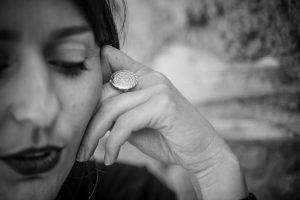Prior to her first concert as Andrra on Tuesday night, we sat down with musician and producer Fatime Kosumi to discuss diasporic life, Albanian folk music, and finding honesty in women’s stories.
“What’s wrong Paline, why are you sad?” whispers Fatime Kosumi in Albanian, softly opening the title song of her first EP as Andrra. “My father wants to marry me off/ Why, oh father, are you throwing me out?” continues Kosumi, replying as Paline, the 14-year-old protagonist to be married to a man she has not met. The song’s lyrics, taken from a folk song from Ulcinj (which date from the 1950s), inspired Kosumi’s first extended play as Andrra, her artistic alias since 2014. The EP is a narrative project telling the story of Paline’s betrothal and marriage in five revamped Albanian folk songs, recomposed by Kosumi and her collaborators Jonas Mueller and PC Nackt.
The concept EP is fantastic not only because Kosumi has unearthed old folk songs and composed them entirely anew into electronic hybrids, but also because despite their sorrow, the songs are goddamn catchy.
I was the embodiment of the diaspora dilemma
I met Kosumi in the old part of Prishtina, where, like two unwitting shacis (as the German-speaking diaspora are called in Kosovo) we sat down to drink tea in a traditional cajtore (teahouse) only to be told that they only served the hot beverage with tea bags. Kosumi was in Kosovo to promote her EP and new video single “Paline,” both of which were released last week (the EP is available on Bandcamp for as little as five euros). More importantly, Kosumi came for Andrra’s world premiere at the Oda Theater on Tuesday.
Born in southern Germany to Kosovar parents, the 36-year-old Kosumi was raised in suburban Rosenheim and says she had very little knowledge of Albanian music beyond the popular music available to the Kosovar diaspora on video cassettes. She moved to Kosovo in 2001, where she dabbled in music and political activism–she was a member of Levizja Vetevendosje before the movement was transformed into a party. Her first album, a mix of pop and R’n’B was called “Nata perbine cdo rendesi” (The night swallows every importance), a self-important title she guffaws at with embarrassment today. In 2009 she moved to Berlin and in 2014 she turned to Albanian folk music for artistic inspiration and reinvented her artistic persona as Andrra.

Fatime Kosumi, alias Andrra. | Photo: Atdhe Mulla
“I was the embodiment of the diaspora dilemma,” said a self-deprecating Kosumi. “When I was a teenager I did not listen to any Albanian music. I discovered a lot of musicians only after I moved to Kosovo.”
Her parents, however, cherished folk music and had cassettes with traditional folk songs featuring defa (tambourines) and cifteli (a traditional stringed instrument). Her mother in particular had tapes of women’s songs, accompanied only by the traditional defa, recorded at the kanagjegj, a traditional women’s only gathering held to say farewell to a bride, who symbolically–and in the past, often literally–must leave her family.
“When I was 15 or 16, we [her siblings] erased my mother’s cassettes, recording things that now you find everywhere on the internet – we recorded Hole or Kurt Cobain,” says Kosumi laughing, though not without some guilt. Later, listening to video recordings from folk music festivals held in Albania in the 1960s and 1970s, Kosumi re-discovered her mother’s songs, but could not find many on the internet.
“While Albanian urban lyric songs are recomposed regularly and have not been forgotten, those rural songs, I felt, they were like my mother – forgotten,” said Kosumi. “I found very few songs with defa. I really wanted to listen to more of them because the lyrics were also very touching.”

Photo: Atdhe Mulla.
This inspired Kosumi to create a documentary chronicling women’s songs across Kosovo. She produced “Kange e Defa” (Songs and Defa), a musical documentary, in collaboration with independent French filmmaker Vincent Moon in 2015 (the film is now available online).
It was around this time that Kosumi also started to find her footing in Berlin, a city that had been “overwhelming” to her.
“I was suspicious of Berlin. I’m embarrassed to say that I needed almost four years to open up to it,” said Kosumi, who is performing “Paline” with the German band Apparat and musician/conductor PC Nackt tonight. “I thought that I would get lost in Berlin…I realized that in fact that ‘closedness’ was what was overtaking me the most, it was doing what I was afraid freedom would.”
Naturally, there were no love songs by women, because women had no business falling in love. Or rather, they had no reason to love.
It took a while for Kosumi to stop thinking of herself as “only Albanian.” Although Germany was not foreign to her, without family or an extended circle of Albanian friends in Berlin, Kosumi understood how one could feel estranged. As a cure to her isolation she turned to Albanian songs, listening to everything from pop folk songs by Sinan Vllasaliu, to old urban lyric songs like Fitnete Rexha’s ballad “Dashurine qe kam per ty” (The love I have for you), a version of which she recorded as Andrra.
“They would evoke the feeling of visiting my aunt in Dobratin [a village in Podujeve], she would listen to them. These songs would bring me closer to my family,” explained Kosumi. During the research phase of “Kange e Defa,” Kosumi’s team discovered many folk songs about various topics, including the feast of St. George, songs about kneading dough, as well as songs for kanagjegj gatherings.
“Naturally, there were no love songs by women, because women had no business falling in love,” said Kosumi cheekily. “Or rather, they had no reason to love.”

Photo: Atdhe Mulla.
According to Kosumi, until the 1980s, even when women sang love songs, they were not sung from the woman’s perspective, but rather from the perspective of the man. This applied to both rural and urban folk songs.
“Unlike [other thematic songs], rural songs for the kanagjegj are songs in which women can sing about their lives because they are singing in a close circle, amongst themselves,” explained Kosumi, who became fixated on lyrics sung to brides before they left the patrimonial household.
“They are honest and show the actual lives of these women. Unlike urban lyric songs, which are poetic, [kanagjegj songs] are direct, without embellishments.”
The five songs that Kosumi chose for her EP were taken from a book by the foremost Albanian folklorist Anton Cetta, who collected ample volumes of Albanian lore. The songs are all from different regions inhabited by Albanians: from Ulcinj in Montenegro, Zym in Kosovo, Ioannina in Greece, and Tetovo, Macedonia. To say they are sorrowful is an understatement, as kanagjegj songs were supposed to make the bride cry and lament her departure. Kosumi’s EP chronicles a forced betrothal of a child-bride, her protest, and reluctant acceptance.
I think the biggest pain is when your experience is not heard, when you feel that you alone have suffered it.
“Paline,” which is expected to be followed by another EP with a different thematic focus, starts with “Kalle Llamen” (Light the lamp), a song about betrothal, and ends with “Kur dola te porta” (When I came to the gate), in which the bride cries with longing over her husband who has gone abroad and has left her alone with his family.
“This is the life cycle of most of the women in my family who are a generation older than me,” said Kosumi, for whom recording the songs was painful and emotional, especially because her aunt had died at the time she was recording.
“My mother cried after each song, firstly because she recognized them, but also because when she saw that someone was making songs with her stories, she felt valuable.”
“I think the biggest pain is when your experience is not heard, when you feel that you alone have suffered it,” explained Kosumi. “I felt that these women were not heard. When something has happened to you, and you see it represented, it makes you feel better about it.”
“I felt like I was doing something good,” smiled Kosumi modestly.
Andrra’s EP “Paline” is available on her website. The EP’s first promo concert will be held at the Oda Theater in Prishtina on May 23, starting at 8 pm.





